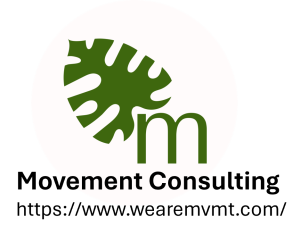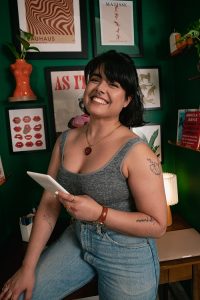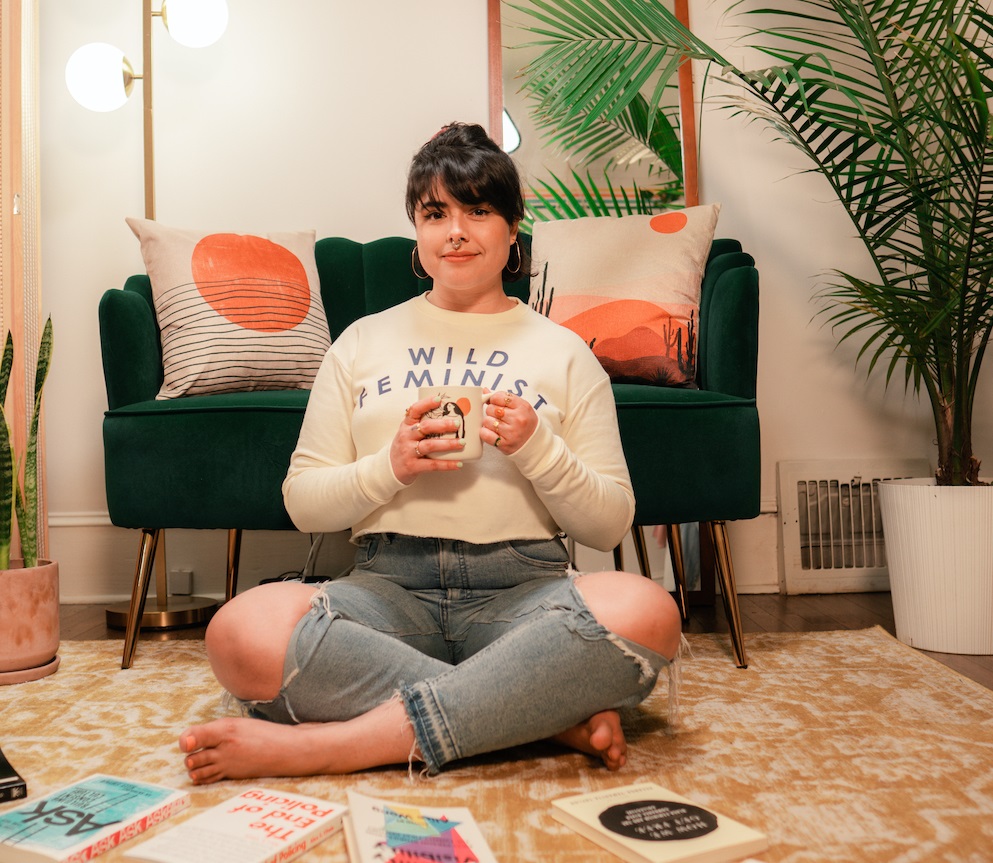When ROOT & SHOOT wanted to develop an immersive, meaningful equity training for a group of professional society leaders, we decided to work with Movement Consulting, an organization led by Dra. Nicole Cabrera Salazar.
Their philosophy states:
“At Movement, we believe in making organizations better now – not by checking diversity boxes, but rather creating immersive learning spaces to build awareness of systems of oppression. With these foundational elements in place, we then contextualize and unpack behaviors on an individual and interpersonal level. From there, we can sustainably build community and shift cultures.”
 This philosophy meshed with what we were looking for, but we were also reassured by knowing that Dra. Nicole, with a Ph.D. in Astrophysics and a long association with the American Astrophysical Society, would understand our culture and values.
This philosophy meshed with what we were looking for, but we were also reassured by knowing that Dra. Nicole, with a Ph.D. in Astrophysics and a long association with the American Astrophysical Society, would understand our culture and values.
Movement designed a custom year-long training program for us, and we invited leaders from seven professional plant science societies to participate. The training program, which included six monthly workshops, learning groups, homework, and consulting hours, created greater awareness of inequity and bias and the confidence to address those issues (read more). As the last part of the training, each organization identified one challenge area to address and worked toward a solution with guidance and feedback as part of a final capstone project.
Our partnership with Movement Consulting was a big success. If you or your organization are seeking professional guidance, expertise, or training, we can recommend Movement Consulting as a great partner.
Recently, we interviewed Dra. Nicole to learn more about her career path, what motivates her, and her advice for early-career scientists. Her comments have been edited and condensed.
 Q1. You have a Ph.D. in astronomy, and during your scientific training you experienced what you describe as a toxic environment. What advice do you have for students or postdocs in a similar situation?
Q1. You have a Ph.D. in astronomy, and during your scientific training you experienced what you describe as a toxic environment. What advice do you have for students or postdocs in a similar situation?
One of the biggest differences between marginalized people who stay in STEM and those who leave is that those who stay have access to a counterspace. Counterspaces are safe social places where people at the margins of the culture can find support, enhancing their feelings of belonging in STEM (see this paper on counter spaces for women of color in STEM by Maria Ong and colleagues). A counterspace can be virtual, like a group chat, a resource group such as the Black Student Association, a physical space, or even a mentoring relationship. The important thing is, everyone needs a space where all of those negative feelings will be counteracted, where you will feel safe and whole, supported and encouraged. That kind of support is crucial for your scientific identity.
It’s also important to build community outside your department. As a PhD student, your department can feel like the whole world and there can be a lot of drama. But once you step outside you realize that these “famous” and renowned academics who are causing you harm are not so important after all. Going beyond the department for community is crucial because it gives you the perspective to understand that that little departmental fishbowl is not the whole world. Similarly, finding mentors and peers outside your department who share your values and identities, especially if you are marginalized, helps you recognize that you are not alone. When I was a student, I became interested in sociology and social justice, and was able to take several sociology courses. These helped me stay connected to my values, because we were having discussions that I could never have had in my department.
Finally, build coalitions. If you are a grad student, you need to find other grad students who share your values and build solidarity with them, because you have much more power as a collective than as an individual. Even as a graduate student, you do have some power – but when you operate as a collective, you can leverage a lot of individual power to create the change you want.
Q2. When we were looking for an equity training program, your STEM background really stood out to us. In what ways do you think that university STEM research culture contributes to the challenges faced by people of marginalized identities, for example, as compared to a corporate culture? Are there aspects of higher education STEM research that make it fundamentally different or more extreme in some way compared to any other workplace cultures?
I have worked with various organizations in academia, STEM, tech, and the non-profit sector, and every single industry has equity and justice problems. And of course, working-class people across industries have it so much worse than academics. The agriculture industry, the manufacturing industry, anything that’s in the secondary labor market where worker protections are practically non-existent have dire working conditions compared to higher education or corporate environments.
However, academia can be particularly tricky to navigate because, while universities have human resources departments, there is generally ambiguity about whether they cover graduate students and postdocs. Also, many early career researchers may not be aware of their right to contact HR, or may not do so because of the high risk of retaliation. Furthermore, many STEM graduate students are international students whose visas are linked to their employment. I have seen many cases of exploitation of those workers, and they rarely have access to systems of accountability or people willing to advocate for them.
Q3. Tell me about some of the trainings and workshops you run.
Because we tailor our programs to each client’s needs and goals, it varies case by case. For instance, we have worked with clients organizing a conference to make sure it is equitable from inception. We also give expert advice to academics conducting climate surveys, hiring new faculty, or participating in graduate admissions.
The core concepts we teach apply to a variety of scenarios, regardless of career level. Our broad audience is people who understand that there are systems of oppression and barriers to access in STEM, and they want to do something about it but do not know how. We teach them how to view these issues through a systemic lens, and from there, how to do the internal work to create sustainable cultural change.
One of the series we run regularly is “From Intent to Impact (I2I),” a 13-week course designed to foster genuine relation in academia through mentorship. I2I is an immersive learning environment that prepares academics in positions of privilege and power to mentor people of marginalized identities through emotional, relational, and collective work. This course focuses on transformative work, where the mentor has to examine who they are.
In order to become aware, we have to understand our own emotions, our biases, the ways we react, our defensiveness. That’s one of the first things we teach. We focus on the internal emotional world because in STEM and academia, we are often asked to give that up. People are robbed of their humanity, and the spaces we inhabit value a lack of emotion. We teach people how to recognize and understand their emotions first, so they can show up to their mentoring relationships from a place of empathy and empowerment.
Q4. In a recent episode of your podcast, The Daily Radical, you spoke about how anti-DEI legislation can affect discussions and actions focused on addressing systemic racism and cultural biases. What is your advice for people who are interested in these topics, how can they avoid running afoul of the law?
While I am not an expert on these very new laws and I could not give anyone specific advice, I would definitely suggest connecting with Jeremy C. Young, the Program Director of Freedom to Learn at PEN America and my guest in the podcast episode you refer to. Jeremy leads PEN America’s efforts to fight government censorship in educational institutions, with a particular focus on the higher education sector.
You can also check out PEN America’s Academic Resource Freedom Guide. One of Jeremy’s key messages is “Don’t self-censor” – in other words, do not overinterpret the threat to your ability to teach and speak up. Follow advice from the university legal office, and within their guidelines keep pushing back against these “educational gag orders.” (Listen to the podcast episode here!)
Q5. If you had a little sister who wanted to follow in your footsteps and pursue a science PhD, what advice would you give her? Is there some way you could prepare her for what she might experience, or would you mostly be ready to pick up the pieces?
I believe strongly in informed consent and I would definitely want to prepare her by sharing my experience, while also empowering her with the tools she needs. Everything I suggested about counterspaces and community is very important. I would also stress the importance of considering non-academic careers and obtaining career counseling, which is available through many universities. Another way to explore career opportunities is through the AAAS IDP (Individual Development Plan), a quiz that matches scientists to jobs beyond academia based on their interests, goals, and values. Of course, I would also be there to listen and support her no matter what she decides to do.
Q6. Tell me something that makes you hopeful for the future.
My clients! I work with incredibly caring people who recognize there is a problem at their institution and are willing to learn and do the work to address it. Seeing how open they are to making change gives me a lot of hope for the future of STEM.
Working with young people also keeps me feeling hopeful. It took me so long to come into my social consciousness, where I was even starting to become aware. I was probably 27 years old when I took my first race and ethnic relations class, and there are undergrads I mentor who are way beyond that. They understand our society in such a clear way, and they are very committed to resolving social issues.
Possibly my greatest hope comes from being around students of color in STEM. At a recent American Astronomical Society meeting, I partnered with several grassroots organizations to create the Rainbow Village. It took us six months to conceptualize and implement this gathering space for people of color, but it was incredibly powerful. Students of color were hanging out, talking to each other, sharing resources; they are doing such brilliant, amazing things, and they inspire me. Being there helped me to remember, “This is my why.” I want to create more spaces where people feel like they belong, like it’s their house. and I want to keep doing this work so they have a chance to stay.
Q7. I know you are a strong advocate for self-care, what do you do to recharge?
You know, the term “self-care” has been so commodified that I like to advocate for community care instead. I sing with the Atlanta Women’s Chorus, and choir is the ultimate community because individual voices are not the point. To be a great chorus, you have to combine your voice with other voices to create one sound. It’s transcendent.
We only have one rehearsal a week, so we’re supposed to regularly practice on our own. I need accountability to do that, so I created an optional Thursday night Zoom practice. We put ourselves on mute, and we each practice what we need to work on in our music – together but also on our own. Whenever I have an opportunity to be in community with other people, I take it! And if it doesn’t exist, I create it.
That’s beautiful, it makes me tingly thinking about your singing. I like how the metaphor of the choir applies to the work you have been doing with us. We have to sing together and blend our voices to make something beautiful, but at the same time we each have to work on ourselves. But we don’t have to do that alone, we can support and encourage each other as we learn and practice.
Dra. Nicole Cabrera Salazar is the CEO and founder of Movement Consulting, a consulting collective that provides immersive learning experiences to bring awareness to systems of oppression, and she is the co-chair of the AAS Committee on the Status of Minorities in Astronomy (CSMA). You can learn more about Movement Consulting through Twitter @wearemvmt, Instagram, and listen to Dra. Nicole’s podcast, the Daily Radical.

0 Comments